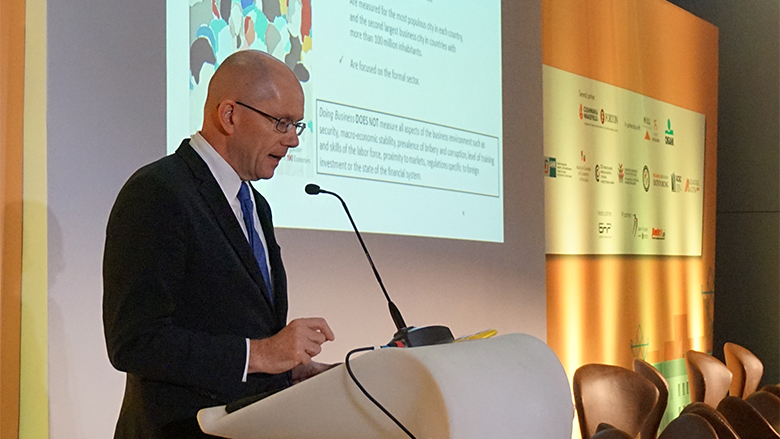Dear President of Republic of Bulgaria,
Deputy Prime Minister,
Dear Mayor of Plovdiv:
It is an honor to be here today.
Thank you for inviting me to this event to present the World Bank’s latest Doing Business global ranking results and to describe what we are doing in support of the government's agenda to improve the business environment in the country.
It is especially great to be doing this in Plovdiv. Plovdiv stands out within Bulgaria – its young and dynamic leadership team has demonstrated its pro-business mindset by implementing strategic and effective measures to attract and facilitate new investments to Plovdiv. Both the President and the Mayor have eloquently presented many of these measures, so I won’t repeat them.
The Plovdiv phenomenon is an impressive example of what is working well in Bulgaria, an example that has helped us to prepare and successfully report before the World Bank Board of Executive Directors our new Partnership Framework for Bulgaria, which outlines the parameters of our support over the next 6 years.
Global rankings measure different things. The numbers 89, 16, 50 and 39 all represent Bulgaria’s global ranking in various fields.
Can you guess which number which Bulgaria ranking represent?
- 89 is Bulgaria’s FIFA Ranking in men’s football;
- 16 is Bulgaria’s men volleyball ranking;
- 50 is Bulgaria’s Competitiveness ranking according to World Economic Forum;
- 39 is Bulgaria’s Doing Business ranking for 2017.
The World Bank’s Doing Business focuses on areas and regulations which can be addressed rapidly. Governments with a strong political commitment to reform can implement reforms and advance in the ranking relatively easily and quickly. In this regard it is unlike the World Economic Forum competitiveness index - advancement in which requires much deeper structural reforms results of which generally register over a longer period of time.
Albania and Belarus Doing Business rankings are good examples of what can be achieved within a very short time. In one year Albania climbed 32 places and is now ranked 58 from 90 in the previous year. Belarus used to be at 50 position but now is 13 places up ranked even higher than Bulgaria at 37 place.
The DB global ranking focuses on 11 areas of business regulation which affect firms throughout their life cycle: from starting a business, to resolving insolvency.
The 14th edition of the World Bank’s Global Doing Business report for 2017 was launched last week (October 25). Among 190 economies measured by Doing Business 2017, New Zealand, Singapore, and Denmark are at the top on the overall ease of Doing Business.
Meanwhile, Bulgaria, ranked at 39, is ahead of Croatia, Cyprus, Greece, Israel, Russia, Italy and Belgium.
Here you can see Bulgaria’s scores in different indicators: the country is doing very well in certain indicators, for example minority investor protection and trade, while there is significant room for improvement in others, notably getting electricity.
A fundamental premise of Doing Business is that economic activity requires good rules which are efficient in their implementation and simple in their interpretation so as to create a level playing field for all economic actors, regardless of their size (multi nationals and SMEs alike).
The global report measures regulations and their implementation in the largest business city. In Bulgaria, it covers Sofia.
Please note that Doing Business does not measure all aspects of the business environment such as security, macro-economic stability, prevalence of bribery and corruption, level of training and skills of the labor force, proximity to markets, or regulations specific to foreign investment.
As you may know I am country manager for the Czech Republic and Slovakia, as well as Bulgaria. A couple of weeks ago I was visiting Czech Republic where their government is eager to improve the country’s ranking (currently 27). Their weakest area is in construction permits (where they are rated #130) so clearly this where they are focusing their efforts to improve. This shows the value of the Doing Business analysis as it clearly points to where countries can concentrate their reform effort for greater effect.
The Government of Bulgaria has also been talking with us about how to improve the country’s rating. As part of this dialogue we prepared a more in-depth analysis of the specific measures that would boost the various rankings – what we call a Doing Business Reform Memorandum.

